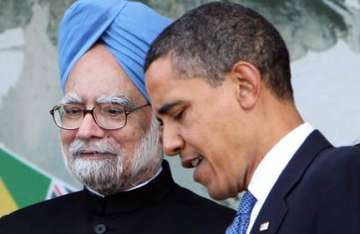India Would Play Role In Afghan 'With Or Without America'
Amid talk of the US looking for a strategy to exit Afghanistan, India on Saturday made it clear that it would continue to play a role in the war-torn nation "with or without America" as

Amid talk of the US looking for a strategy to exit Afghanistan, India on Saturday made it clear that it would continue to play a role in the war-torn nation "with or without America" as it has crucial stakes in the stability of country on its periphery.
Ahead of the meeting between Prime Minister Manmohan Singh and President Barack Obama during which Afghanistan will figure, sources said India's policy on Afghanistan will be determined by its own interests and not by what others do. Singh will be here on a four-day visit to attend Nuclear Security Summit on April 12-13. "We will play a role in Afghanistan with or without the US because Afghanistan is in our immediate periphery and we will do all to protect our periphery," sources said.
The sources noted that India and the US had common goals in Afghanistan that the country should be stable, peaceful and there should be no outside interference. But the question was about reaching there, they said while emphasising the need for coordination. The comments came in the backdrop of a talk that the US was planning to leave Afghanistan for which it was looking for a strategy.
At one time, the US had talked about handing over the security of Afghanistan to regional countries like Pakistan, Iran and others. This, however, could not happen because of the US' own problems with Iran and internal situation in Kyrghzstan. Indian government believes that Pakistan would not be entrusted with any prominent role in the affairs of Afghanistan even though "some parts" of Pakistan would be used by the US in Afghanistan. About options that India has in case the US-led forces quit Afghanistan, the sources said India will devise its strategy according to the evolving situation and work with those who matter.
On Pakistan's role in Afghanistan, the sources said it has been saying that it was willing to do more in that country in terms of fighting terrorism. "India will be happy if Pakistan does our job against terrorism," they said. With regard to the conditions within Afghanistan, the sources said military situation was better than six months ago but politically, the country remains fragmented.
During their meeting, Singh and Obama are expected to discuss Afghanistan in the context of the new strategy on Afghanistan and Pakistan unveiled by the US President a few months back.
The two leaders are also expected to discuss Pakistan where some important developments have taken place over the last few days, with Constitution being amended to strip the President of some sweeping powers.
However, Indian establishment is not impressed by these developments as it feels that the military continues to wield enormous influence and power in Pakistan, preventing it to be a democracy in the real sense. The sources said India will face problems like access to the establishment, dealing with problem of terrorism and understanding what Pakistan is doing in Afghanistan. Besides, there is the risk of nuclear material falling into the hands of terrorists, which is a matter of serious concern for India.
National Security Adviser Shivshankar Menon and Foreign Secretary Nirupama Rao are expected to raise articulate these concerns at the official-level meetings to be held on the sidelines of the two-day Nuclear Security Summit. Singh and Obama will also discuss the next steps in the Indo-US strategic relations, which were recently marked by the conclusion of agreement on reprocessing. The reprocessing agreement, a crucial step for implementation of the historic Indo-US civil nuclear deal, was reached last month.
The two leaders are expected to give directions to the future of the bilateral ties, ahead of the second strategic dialogue to be held two months later in Washington. External Affairs Minister S M Krishna will be traveling here for the same. The first strategic dialogue was held in New Delhi last year.
Talking about implementation of the Indo-US nuclear deal, the sources noted that almost everything had been tied up and only a few pieces were remaining With regard to the Reprocessing agreement, the sources noted that it reflected significant achievements for India. One of them is the provision for setting up more than one facility for reprocessing spent fuel. Under the 123 agreement, India was to set up one such facility and the US negotiators insisted on this. However, the Indian side cited practical difficulties in this regard and managed to convince the US. Secondly, physical protection of the reprocessing facilities would be the responsibility of IAEA and the US would have no "intrusive" role. PTI